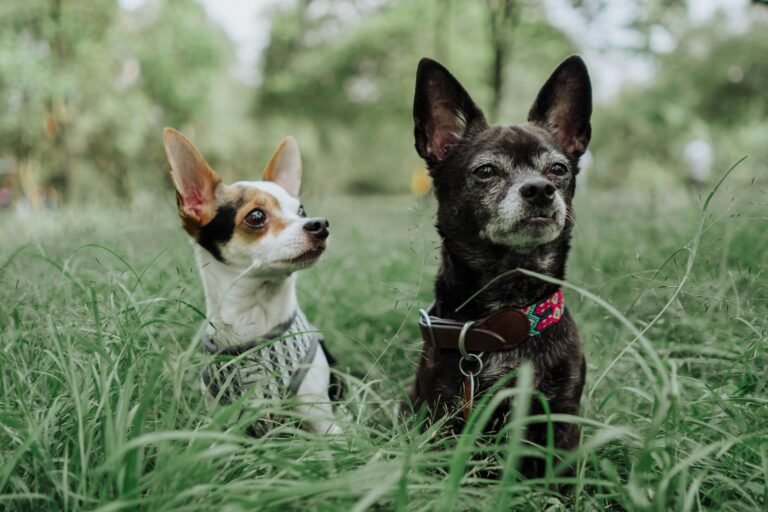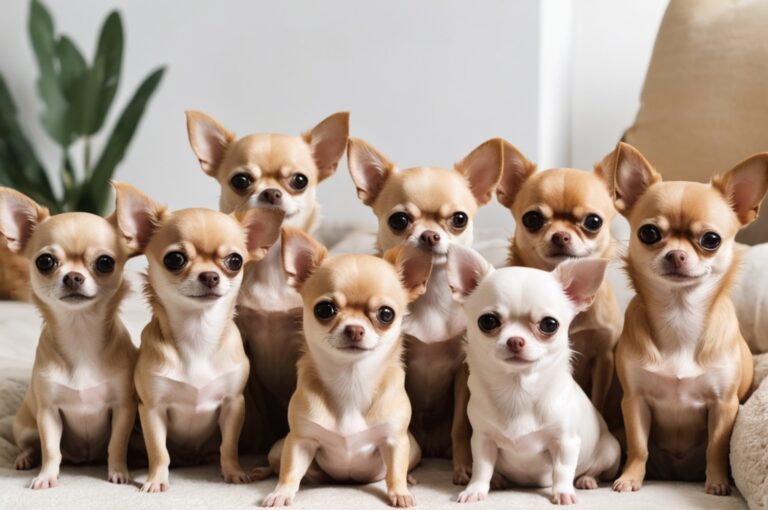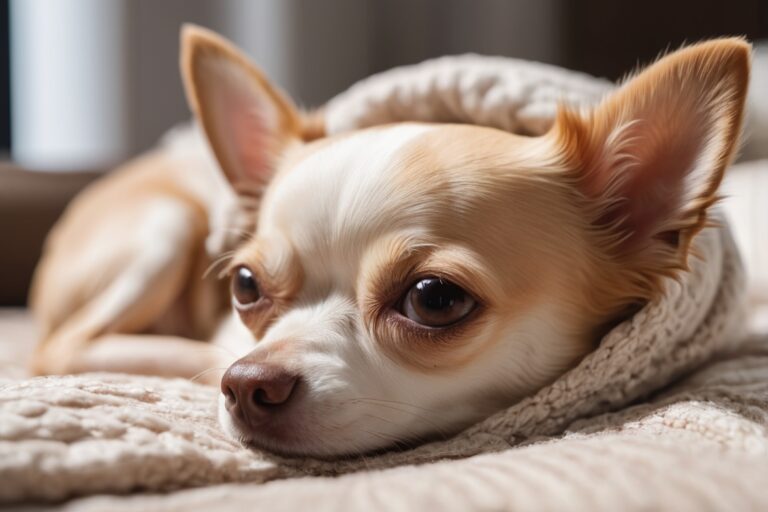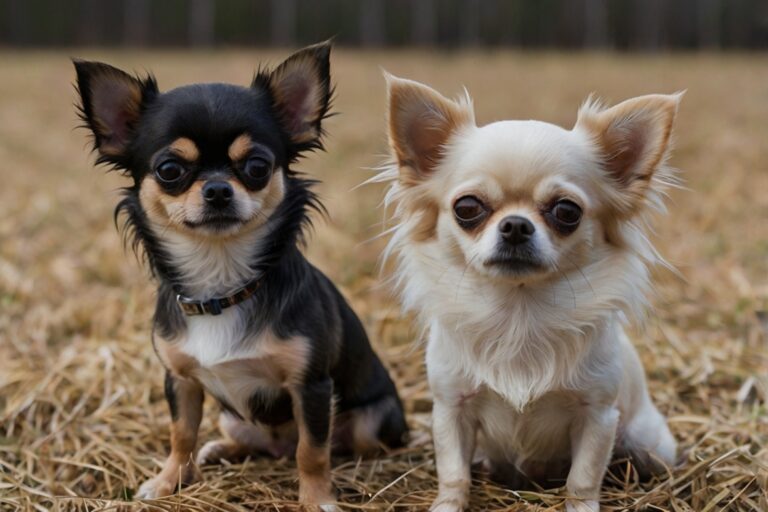Can Older Chihuahuas Be Bred? Risks and Considerations
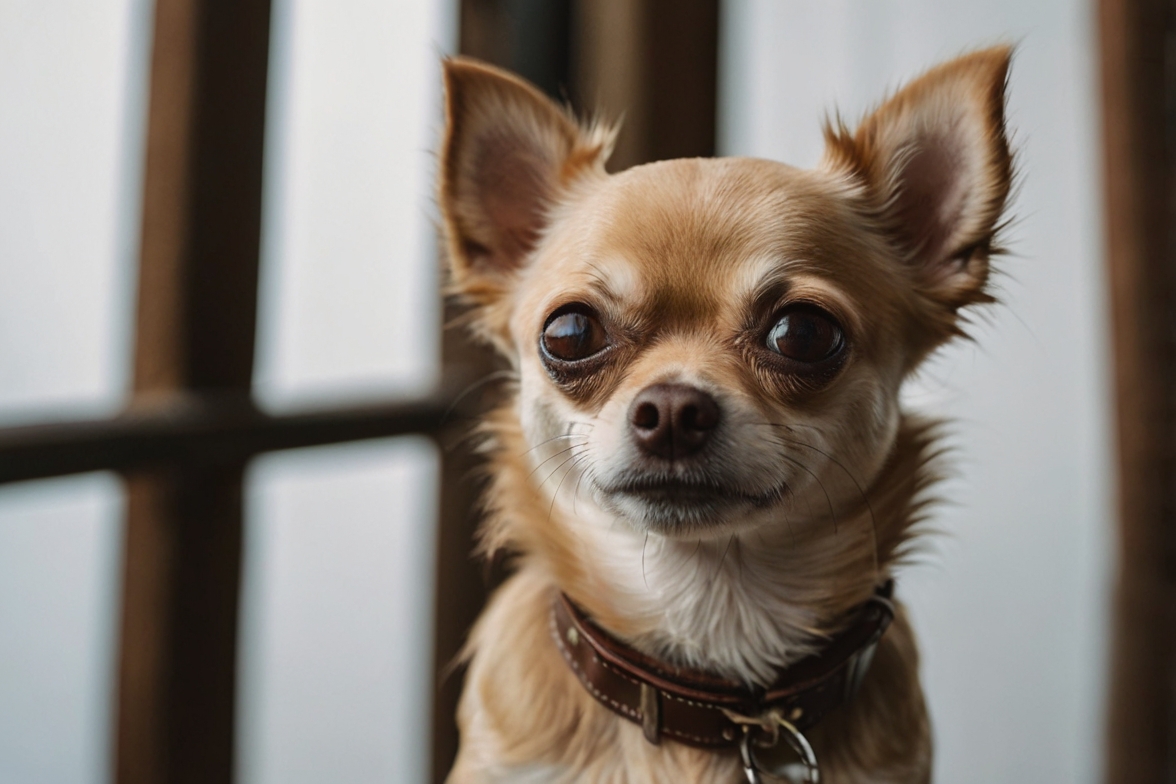
As a Chihuahua breeder, it’s important to carefully consider the age of your breeding dogs, especially as they get older. While many breeders focus on younger, more fertile Chihuahuas, some may wonder whether it’s possible or safe to breed an older Chihuahua. Although it is technically possible to breed older Chihuahuas, there are significant risks and considerations to take into account. These risks can affect the health of both the mother and her puppies, as well as the long-term success of your breeding program.
In this article, we’ll explore the risks and considerations associated with breeding older Chihuahuas, focusing on both females and males. We’ll discuss how age impacts fertility, the potential for pregnancy complications, and how to ethically approach breeding decisions as your Chihuahuas age.
1. Understanding the Risks of Breeding Older Chihuahuas
Breeding older Chihuahuas carries several risks that can complicate both the breeding process and the health of the dog. As Chihuahuas age, their reproductive systems begin to slow down, making the process more challenging and risky. Understanding these risks is essential for making informed decisions about whether or not to breed an older dog.
1.1 Decline in Fertility with Age
One of the primary risks of breeding older Chihuahuas is the natural decline in fertility that occurs as dogs age. Female Chihuahuas typically experience a decrease in fertility after the age of five or six. Although they may still go into heat and appear capable of breeding, their chances of successfully conceiving decrease with each cycle. This decline in fertility is due to a combination of factors, including hormonal changes, a reduction in egg quality, and potential underlying health issues that may have developed over the years.
For male Chihuahuas, fertility also declines with age. Older males produce fewer sperm, and the quality of the sperm they produce may decrease as well. This decline can make it more difficult to achieve successful matings and can also result in smaller litter sizes or, in some cases, failed pregnancies. Older males are also more prone to age-related issues that can affect their ability to breed, such as decreased libido and reduced physical stamina.
As fertility declines, breeders may experience frustration in trying to breed older dogs, leading to repeated unsuccessful attempts. These unsuccessful attempts not only delay the breeding program but can also place additional physical and emotional stress on the dogs involved. This is especially true for female Chihuahuas, as the repeated hormonal shifts and unproductive cycles can have a negative impact on their overall well-being.
1.2 Increased Risk of Complications During Pregnancy
The risks associated with breeding older Chihuahuas are not limited to fertility issues. Older female Chihuahuas are also more likely to experience complications during pregnancy and whelping. One of the most common complications is dystocia, or difficult labor, which occurs when the mother is unable to deliver the puppies naturally. Dystocia is particularly dangerous for small breeds like Chihuahuas, as their tiny size makes them more prone to birthing difficulties.
Older female Chihuahuas may also have weakened muscles and a less flexible pelvis, both of which can contribute to complications during the birthing process. In some cases, these complications can be life-threatening for both the mother and the puppies. For example, if a puppy becomes stuck in the birth canal and the mother is unable to deliver naturally, an emergency cesarean section may be required to save both the mother and the puppies.
Additionally, older females are at a higher risk of miscarriages, stillbirths, and delivering smaller, weaker puppies. These complications can be emotionally devastating for breeders, as well as financially costly, especially if veterinary intervention is required. Even if the pregnancy is successful, older females may struggle to nurse and care for their puppies, requiring breeders to step in and provide additional support.
1.3 Health Issues in Older Dogs That Impact Breeding
As Chihuahuas age, they are more likely to develop health issues that can interfere with breeding. Common age-related health problems in Chihuahuas include heart disease, arthritis, dental issues, and metabolic disorders like diabetes. These conditions can significantly impact the dog’s ability to safely carry and deliver a litter.
For example, a Chihuahua with heart disease may experience additional strain during pregnancy and whelping, putting her at risk for heart failure or other complications. Similarly, a dog with arthritis may struggle to care for her puppies due to pain and limited mobility. Dental issues can affect the dog’s ability to eat properly, leading to malnutrition during pregnancy, which in turn can impact the development of the puppies.
In addition to physical health issues, older Chihuahuas may also experience cognitive decline. Cognitive dysfunction syndrome (CDS) is a condition similar to dementia in humans, and it can affect older dogs’ ability to adapt to changes in their environment, such as the stress and demands of pregnancy and raising a litter. Breeding a dog with cognitive decline can lead to behavioral issues, such as difficulty caring for the puppies or increased anxiety during whelping.
2. Effects of Breeding on Older Chihuahua Females

Breeding older female Chihuahuas comes with unique challenges that go beyond the initial risks of conception. The effects of pregnancy and whelping on an older dog’s body can be severe, potentially leading to long-term health issues or even life-threatening complications. Understanding how pregnancy impacts older female Chihuahuas is crucial for breeders considering breeding them later in life.
2.1 Dystocia and Birth Complications
One of the most significant risks for older female Chihuahuas is dystocia, or difficult labor. As mentioned earlier, Chihuahuas are already prone to dystocia due to their small size, but this risk increases with age. Older dogs may have weakened uterine muscles and reduced flexibility in the pelvic area, making it harder for them to deliver puppies naturally. Additionally, the size and position of the puppies can further complicate the birthing process.
In many cases, older females may require a cesarean section (C-section) to deliver the puppies safely. While C-sections are a common and often life-saving procedure for small breeds, they come with their own set of risks, particularly for older dogs. Older Chihuahuas may take longer to recover from surgery, and the anesthesia and stress of the procedure can put additional strain on their hearts and other vital organs.
Breeders need to be prepared for the possibility of a C-section when breeding older females and should work closely with their veterinarian to monitor the pregnancy and plan for any potential complications. In some cases, it may be advisable to avoid breeding an older female altogether, especially if she has a history of difficult deliveries or health issues.
2.2 Weaker Immune System During Pregnancy
As Chihuahuas age, their immune systems weaken, making them more susceptible to infections and other health problems. Pregnancy can place additional strain on the immune system, leaving older female Chihuahuas vulnerable to conditions such as uterine infections (pyometra), respiratory infections, or skin infections. These infections can not only endanger the health of the mother but also affect the development and survival of the puppies.
A weakened immune system can also lead to complications during whelping, such as slower healing after delivery or an increased risk of infection at the incision site if a C-section is performed. Older females may also have difficulty producing enough milk to nurse their puppies, leading to malnutrition and developmental issues in the litter.
Breeders should take extra precautions to ensure that older females receive proper veterinary care throughout their pregnancies, including vaccinations, parasite control, and regular check-ups to monitor their health. In some cases, supplemental care, such as bottle feeding the puppies or administering immune-boosting supplements, may be necessary to support both the mother and her puppies.
2.3 Longer Recovery Time Post-Whelping
Older female Chihuahuas typically require longer recovery times after whelping compared to younger dogs. The physical toll of pregnancy, whelping, and nursing can be much harder on an older dog’s body, leading to fatigue, muscle weakness, and slower healing. Older dogs may also experience difficulty producing enough milk to nourish their puppies, leading to dehydration and malnutrition in the litter.
Breeders must be prepared to provide extra support to older females during the postpartum period. This may include ensuring that the dog receives a nutrient-rich diet, providing supplements to support lactation, and monitoring her closely for signs of infection or other complications. In some cases, breeders may need to step in and assist with feeding the puppies if the mother is unable to produce enough milk.
The extended recovery time can also affect the female’s long-term health. Older dogs may experience lingering fatigue or weakness after pregnancy, making it harder for them to return to their normal activities. Additionally, repeated pregnancies can take a significant toll on an older dog’s body, leading to a decline in overall health and well-being. For this reason, many breeders choose to retire their female Chihuahuas from breeding once they reach a certain age, usually around six or seven years old, to avoid putting them at further risk.
3. Effects of Breeding on Older Chihuahua Males

While most discussions about breeding older dogs focus on females, it’s important not to overlook the potential challenges and risks associated with breeding older male Chihuahuas. Male fertility also declines with age, and breeding an older male Chihuahua may result in reduced litter sizes, lower-quality sperm, or an increased likelihood of genetic issues being passed down. Understanding how aging affects male Chihuahuas can help breeders make informed decisions and maintain the health and success of their breeding programs.
3.1 Decline in Sperm Quality and Quantity
As male Chihuahuas age, their sperm production tends to decrease, both in terms of quantity and quality. While younger males produce a higher volume of sperm with better motility, older males may experience a reduction in sperm count and motility. This decline in sperm quality can lead to lower fertility rates, meaning that the older male Chihuahua may not be able to successfully impregnate a female as easily as he could in his younger years.
Lower sperm quality can also affect the viability of the puppies. Puppies conceived from older males may have a higher risk of being born with health issues or may be less robust compared to those sired by younger males. Additionally, older males may produce smaller litters because fewer eggs are fertilized due to the lower sperm count.
For breeders, it’s important to evaluate the reproductive health of older male Chihuahuas through sperm analysis and veterinary checkups. If the male is showing signs of reduced fertility, it may be necessary to retire him from breeding or consider artificial insemination methods to improve the chances of successful conception.
3.2 Potential for Passing on Genetic Issues
One of the key risks of breeding older male Chihuahuas is the increased likelihood of passing on genetic mutations or hereditary conditions. As dogs age, their DNA becomes more prone to mutations, which can be passed down to their offspring. This is particularly concerning in small breeds like Chihuahuas, where certain genetic disorders, such as patellar luxation, heart defects, and eye problems, are more common.
Older males may also carry recessive genetic traits that, when paired with a female carrying the same trait, can result in puppies with hereditary health issues. DNA testing and genetic screening can help identify potential risks before breeding, but even with testing, the chances of passing on genetic mutations increase with the sire’s age.
To minimize the risk of genetic problems, breeders should prioritize using younger, healthier males or ensure that older males have undergone comprehensive genetic testing. Breeding older males without proper screening can result in litters with health problems, which could harm the reputation of the breeding program and result in increased veterinary costs for the new owners.
3.3 Physical Strain During Mating
Older male Chihuahuas may experience physical strain during the mating process due to age-related health issues, such as arthritis, decreased stamina, or general fatigue. Mating can be physically demanding, and for older males with joint problems or reduced mobility, the act of breeding can become uncomfortable or even painful.
Physical strain during mating can also lead to injuries, such as muscle tears or joint dislocations, especially in older males who are already experiencing age-related weakness. Breeders should take care to monitor the health and physical condition of older males during breeding attempts to prevent injuries.
In some cases, artificial insemination may be a better option for older males, as it allows for reproduction without putting the dog through the physical demands of natural mating. This method can help reduce the strain on the dog’s body and still allow for successful breeding, particularly if the male is otherwise healthy but struggling with mobility issues.
4. Considerations Before Breeding Older Chihuahuas

Before deciding to breed an older Chihuahua, whether male or female, it is essential to carefully evaluate the risks and consult with a veterinarian to assess the dog’s overall health. Breeding older dogs requires more planning and attention to detail, as their bodies are not as resilient as they once were. In many cases, it may be more ethical and responsible to retire older dogs from breeding and focus on younger, healthier individuals.
4.1 Veterinary Health Assessment
The first and most important step before breeding an older Chihuahua is to schedule a thorough veterinary health assessment. This checkup should include a physical examination, blood tests, genetic screening, and any necessary reproductive health tests, such as sperm analysis for males or ultrasound for females.
During the health assessment, the vet will evaluate the dog’s heart, lungs, joints, and reproductive organs to ensure that they are fit for breeding. For older females, the vet may also check for any potential issues with the uterus or ovaries that could complicate pregnancy. For males, the vet will assess the quality and quantity of sperm to determine if they are still capable of producing healthy litters.
A full veterinary assessment is essential for identifying any underlying health issues that may not be immediately apparent but could impact the dog’s ability to breed safely. If the vet determines that the dog is not in good enough health to breed, it may be time to consider retiring them from breeding.
4.2 Breeding Alternatives for Older Dogs
In some cases, even if an older Chihuahua is physically capable of breeding, it may not be the best decision for their long-term health. Instead of continuing to breed an older dog, breeders can explore alternative ways to contribute to their breeding program. One option is to retire the older dog from breeding and focus on younger, healthier dogs that are in their prime breeding years.
Retiring an older dog does not mean that they no longer have value to the breeding program. Older Chihuahuas can play an important role in socializing younger dogs, teaching them how to behave around other dogs and humans. They can also serve as companions to new litters, helping puppies learn important social skills.
Another alternative is to use artificial insemination with sperm that was collected and stored from the male Chihuahua when he was younger and healthier. This allows breeders to continue using the genetic material from an older male without subjecting him to the physical strain of mating.
4.3 Ethical Considerations in Breeding Older Chihuahuas
Ethical considerations play a significant role in deciding whether to breed an older Chihuahua. While it may be tempting to continue breeding a dog with desirable traits, the health and well-being of the animal should always come first. Breeding older dogs, especially females, carries significant risks, and pushing a dog to breed when they are past their prime can result in serious health problems, including difficult pregnancies, complications during birth, and long recovery times.
Breeders must weigh the potential benefits of breeding an older dog against the risks to the dog’s health and the quality of life they will experience during and after the breeding process. If an older Chihuahua has already produced several successful litters, it may be more ethical to retire them from breeding and allow them to enjoy a peaceful, stress-free life as a companion animal.
Additionally, breeders should consider the long-term health of the puppies. Breeding older Chihuahuas increases the likelihood of genetic issues or health complications in the offspring, which can lead to increased veterinary costs for the new owners and lower the overall quality of the breed. Ethical breeders prioritize the health of both the parent dogs and their puppies, making responsible decisions about when to stop breeding.

Conclusion
Breeding older Chihuahuas is a complex decision that requires careful consideration of the risks and potential health impacts. While older Chihuahuas can still breed, the decline in fertility, increased risk of complications, and potential health issues make it a challenging and often risky process. Both male and female Chihuahuas experience significant changes as they age, which can affect their ability to conceive, carry, and deliver healthy litters.
Before breeding an older Chihuahua, breeders should always consult with a veterinarian to assess the dog’s overall health and reproductive capability. Additionally, breeders must consider the ethical implications of breeding older dogs and whether it is in the best interest of the animal’s health and well-being.
In many cases, it may be more responsible to retire older Chihuahuas from breeding and focus on younger, healthier dogs that are better equipped to handle the demands of pregnancy and whelping. By making informed, ethical decisions, breeders can ensure the long-term health and success of their breeding programs, while also protecting the welfare of their beloved dogs.


